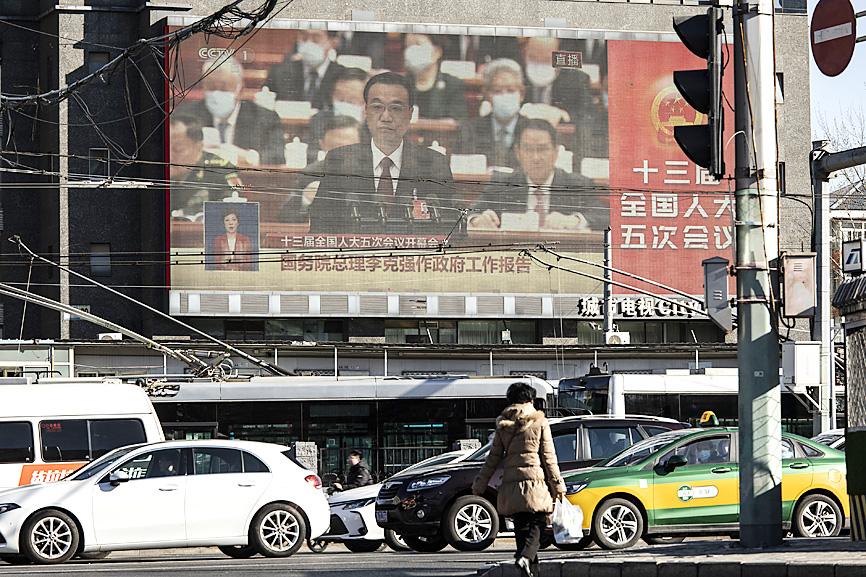Beijing’s comments and policies regarding Taiwan are and always have been “self-intoxicating propaganda that Taiwanese reject,” the Mainland Affairs Council (MAC) said yesterday, shortly after Chinese Premier Li Keqiang (李克強) said that Beijing stands by the “one China” principle and the so-called “1992 consensus.”
Speaking at the opening of the annual Chinese National People’s Congress, Li said: “We firmly oppose any separatist activities seeking ‘Taiwan independence’ and firmly oppose foreign interference.”
“All of us, Chinese on both sides of the Taiwan Strait, should come together to advance the great and glorious cause of China’s rejuvenation,” he said. “We will advance the peaceful growth of relations across the Taiwan Strait and the reunification of China.”

Photo: Bloomberg
The MAC said that the Chinese Communist Party’s (CCP) “one China” principle runs contrary to “historical facts and the present reality.”
Any activity undertaken with the aim of denying the sovereignty of Taiwan or its participation in the global community would be a breach of international law, world peace and the wishes of Taiwanese, it said.
China would do well to refrain from using military force, making threats and other unacceptable behavior, it said.
China has increased its military activity near Taiwan over the past two years, and yesterday announced that it was raising its defense spending 7.1 percent to US$229 billion this year.
China has the world’s second-largest defense budget after the US, enabling it to maintain the largest standing military, with 3 million personnel and an arsenal of advanced weaponry, including two aircraft carriers with more on the way, stealth fighters, an advanced missile force and nuclear-powered submarines.
This year’s increase exceeds the 6.8 percent boost from last year, showing China’s determination to maintain the drive to expand and modernize its armed forces despite high levels of government debt and a slowing economy, partly as a result of the COVID-19 pandemic.
By contrast, the US this year increased its defense spending by about 2 percent to US$768.2 billion.
The Chinese government said that most of the spending increases would go toward improving troops’ welfare.
The budget omits much of China’s spending on weaponry, most of which is developed domestically, observers said.
Li said China would “fully implement [Chinese President] Xi Jinping’s (習近平) thinking on strengthening the armed forces and the military strategy for the new era ... and strengthen party leadership and party building in all aspects of the military.”
Kuo Yu-jen (郭育仁), a security expert at Taiwan’s National Sun Yat-sen University’s Institute of China and Asia-Pacific Studies, said that Beijing was being forced to spend more on research and development in light of the US-China technology dispute.
“Costs for China’s third and fourth aircraft carriers are going up, too,” he added.
The “1992 consensus” — a term former MAC chairman Su Chi (蘇起) in 2006 admitted making up in 2000 — refers to a supposed tacit understanding between the Chinese Nationalist Party (KMT) and the CCP that both sides of the Taiwan Strait acknowledge that there is “one China,” with each side having its own interpretation of what “China” means.
The DPP says the “1992 consensus” does not exist.

US President Donald Trump yesterday announced sweeping "reciprocal tariffs" on US trading partners, including a 32 percent tax on goods from Taiwan that is set to take effect on Wednesday. At a Rose Garden event, Trump declared a 10 percent baseline tax on imports from all countries, with the White House saying it would take effect on Saturday. Countries with larger trade surpluses with the US would face higher duties beginning on Wednesday, including Taiwan (32 percent), China (34 percent), Japan (24 percent), South Korea (25 percent), Vietnam (46 percent) and Thailand (36 percent). Canada and Mexico, the two largest US trading

AIR SUPPORT: The Ministry of National Defense thanked the US for the delivery, adding that it was an indicator of the White House’s commitment to the Taiwan Relations Act Deputy Minister of National Defense Po Horng-huei (柏鴻輝) and Representative to the US Alexander Yui on Friday attended a delivery ceremony for the first of Taiwan’s long-awaited 66 F-16C/D Block 70 jets at a Lockheed Martin Corp factory in Greenville, South Carolina. “We are so proud to be the global home of the F-16 and to support Taiwan’s air defense capabilities,” US Representative William Timmons wrote on X, alongside a photograph of Taiwanese and US officials at the event. The F-16C/D Block 70 jets Taiwan ordered have the same capabilities as aircraft that had been upgraded to F-16Vs. The batch of Lockheed Martin

GRIDLOCK: The National Fire Agency’s Special Search and Rescue team is on standby to travel to the countries to help out with the rescue effort A powerful earthquake rocked Myanmar and neighboring Thailand yesterday, killing at least three people in Bangkok and burying dozens when a high-rise building under construction collapsed. Footage shared on social media from Myanmar’s second-largest city showed widespread destruction, raising fears that many were trapped under the rubble or killed. The magnitude 7.7 earthquake, with an epicenter near Mandalay in Myanmar, struck at midday and was followed by a strong magnitude 6.4 aftershock. The extent of death, injury and destruction — especially in Myanmar, which is embroiled in a civil war and where information is tightly controlled at the best of times —

China's military today said it began joint army, navy and rocket force exercises around Taiwan to "serve as a stern warning and powerful deterrent against Taiwanese independence," calling President William Lai (賴清德) a "parasite." The exercises come after Lai called Beijing a "foreign hostile force" last month. More than 10 Chinese military ships approached close to Taiwan's 24 nautical mile (44.4km) contiguous zone this morning and Taiwan sent its own warships to respond, two senior Taiwanese officials said. Taiwan has not yet detected any live fire by the Chinese military so far, one of the officials said. The drills took place after US Secretary